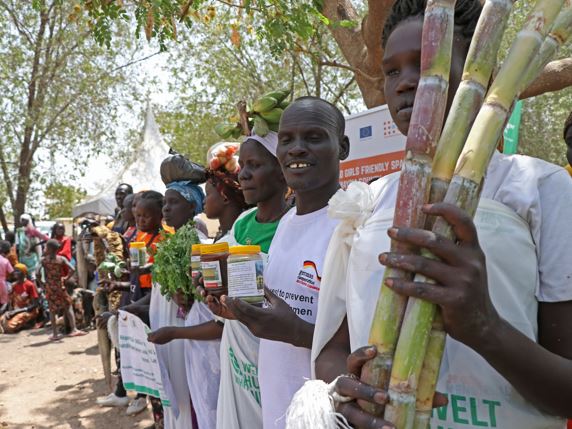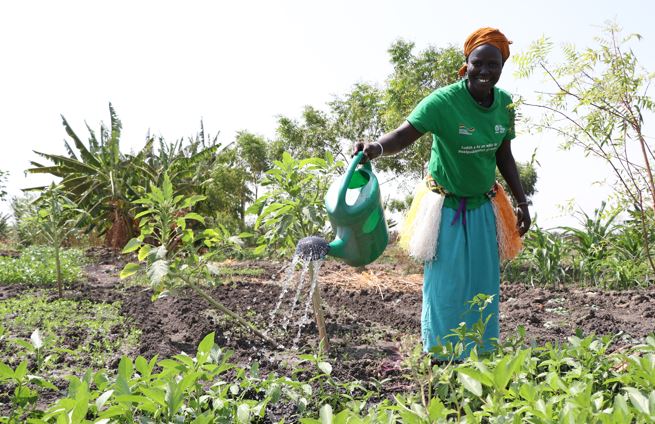July marked the successful conclusion of the project “RE-LIVE: Re-building and Securing Livelihoods in Greater Rubkona,” implemented by Welthungerhilfe (WHH) South Sudan and funded by the German Federal Ministry for Economic Cooperation and Development (BMZ).
Over the last five years, it contributed to improving food security and stabilizing the livelihoods of 36,000 people in Greater Rubkona, Unity State.
WHH said the project started in 2019, but with the 2021 floods that affected Unity State, much of the population’s progress in re-building their livelihoods, improving food production and rehabilitating infrastructure faced severe setbacks. Over 90 percent of project areas were submerged, wiping out farming and pasture lands; vital productive assets like cattle and poultry were lost; homes and small businesses became unreachable. Following the flood emergency, the 1.6 million top-up from BMZ was crucial for helping communities recover and strengthen their resilience. Despite being displaced and losing their possessions, people immediately started working to get their lives back on track.
450 farmers set up 18 multi-crop model gardens, cultivating an impressive variety of over thirteen vegetables and staple crops to be consumed at home. The excess produce is sold on local markets. This means that gardens are a source of food and balanced nutrition and can sustain families financially. An overwhelming 98 percent of the 4,000 households involved in the project reported at least a 15 percent increase in crop yields and, on average, families now rely on an additional two months of food security.
“We grow our own staples and vegetable crops, with different produce available in different seasons. Maize is available all year round,” explains James Gawar Kuol, the lead of a farmers’ group taking care of a garden in Haingas, Bentiu. “We eat the vegetables that we harvest at home, and we also sell them on the market. On average, we earn 30,000 South Sudanese Pounds per month with the sales.”
According to WHH South Sudan, these encouraging results have been achieved thanks to the promotion of sustainable small-scale irrigation techniques powered by solar pumps that allow farmers to cultivate all year round. In addition, farmers attended hands-on training on good agricultural practices, seed selection, land preparation, sowing and crop management, compost making and utilization, crop rotation, and post-harvest management. As farming techniques improved, farmers have been able to add four new crops to the variety of vegetables grown: sukuma wiki, amaranthus, jute mallow, and eggplant.
“But the impact of the project does not stop at farming. The project also promoted diverse business activities, such as poultry farming, egg production, beekeeping and honey production, sugarcane cultivation, production and marketing of moringa powder, and fish preservation,” a statement from WHH South Sudan explained. “Thanks to a loan system set up through Village Savings and Loan Associations (VSLA), more than 2,000 community members have been able to invest in new small businesses and sustain their agricultural efforts.”
It added: “The VSLAs have positively impacted community well-being, economic opportunities, and financial inclusion for women, who make up the majority of VSLA members and over 94 percent of VSLA members reported an income boost, with nearly a third experiencing substantial increases of 60 percent or more.”

As a community leader from Rubkona shared, “VSLA groups have developed mechanisms to manage themselves, holding each other accountable.” The expectation is that these groups will continue to thrive independently, sustaining the economic growth they have sparked.
To complement the farming and business activities, the project integrated holistic training on nutrition and hygiene practices, menstrual hygiene management, and gender equality. As part of the training package, communities particularly enjoyed cooking demonstrations as they connected crop production to food consumption. Women and young girls also highlighted the importance of menstrual hygiene awareness activities, including the use of Ruby’s menstrual cup.
Training on gender-related issues has been a unique component of the project. The training contributed to empowering women to have a say in household decisions, from crop selection to budgeting. This shift in family dynamics has led to significant improvements in food and nutrition security across households. The training also increased men’s acceptance of women’s active participation in community development, initiating a virtuous cycle that saw women’s involvement in projects at the community level jump from 10 percent to 70 percent.
As the RE-LIVE project wraps up, the focus is on prospects for the future.
“The gardens set up by WHH have significant opportunities for being scaled,” says Joshua Kanyara, Area-Based Leadership Coordinator at the UN Office of the Resident Coordinator in Bentiu. He highlighted the variety of vegetable crops, good irrigation systems, and community management of the gardens as their main strengths.
With an increasingly pressing need to transition from emergency food assistance to sustainable solutions that can ensure food security in the long run, it is time for humanitarian and development partners to come together, exchange lessons learned from their respective interventions and collectively design suitable models to replicate across locations in the State. Farmers also need to be better connected to identify opportunities that can bring higher returns on their investment in agriculture. This will increase their motivation and the willingness of younger generations to take up farming.
Some of the farmers running the gardens are already planning their next steps, such as sourcing seeds for new crops independently and scaling up group and individual businesses using VSLA savings. The RE-LIVE project may be ending, but the knowledge, skills, and confidence it has helped boost will keep flourishing. Communities in Greater Rubkona are motivated to keep building on this foundation for a more resilient future.




